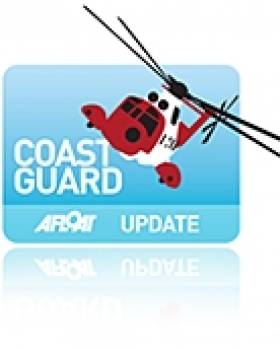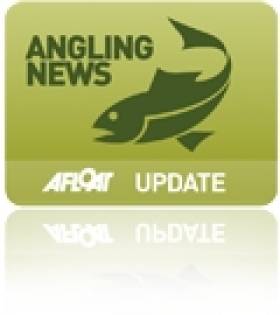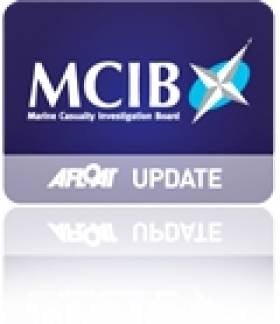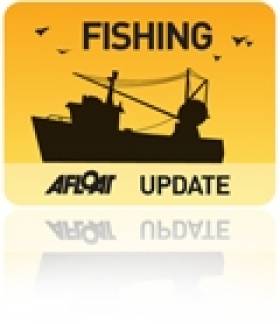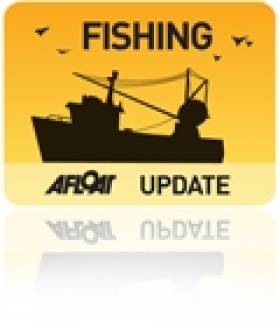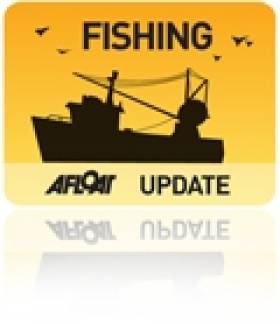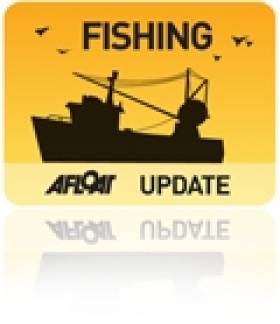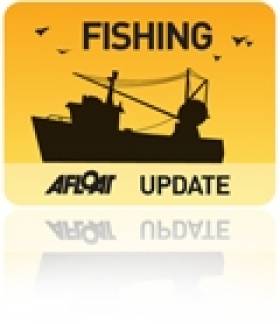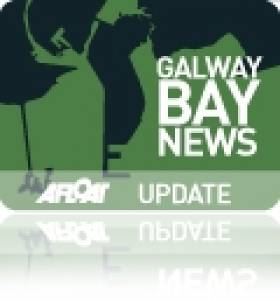Displaying items by tag: Fishing
Two Dead In Separate Incidents At Sea On Thursday
#Coastguard - The Irish Times reports on the death of a local fisherman off the Waterford coast on Thursday morning in an incident that prompted a major coastguard and lifeboat search and rescue operation - six years to the day after the tragic sinking of Dunmore East trawler the Pere Charles.
The Irish Coast Guard's Rescue 117 helicopter was dispatched to before 8am along with the RNLI lifeboats from Dunmore East and Tramore to the scene off Brownstown Head after a 16-foot fishing boat capsized, throwing its two-man crew into the water.
James Tate reached the shore unaided after some two hours in the water to raise the alarm. He was later treated for shock and hypothermia.
His friend Johnny Flynn - a former member of the Dunmore East lifeboat crew, according to the Irish Independent - was found unconscious in the water by the coastguard helicopter before 8.30am, but efforts to resuscitate him were unsuccessful.
The men's boat has been recovered, and a spokesperson for the Marine Casualty Investigation Board confirmed that a full investigation and inquest into Flynn's death would take place.
The incident came just two days after four fishermen were rescued from their boat off Hook Head in Co Waterford.
Elsewhere, it's reported that a Spanish fisherman died after sustaining head injuries on a trawler off Loop Head in Co Clare on Thursday morning.
The Irish Times has more on both stories HERE.
Low Cost Licences To Encourage Angling Tourism Says Minister
#Angling - The Minister of State for Natural Resources has said the unchanged cost of fishing licences this year should encourage angling tourism in Ireland.
Commenting Thursday on his approval of the new regulations and by-laws for Ireland's wild salmon fishery which came into force on 1 January, Minister Fergus O'Dowd said: "Last year I lowered the cost of fishing licences and I have decided to maintain that price cut for 2013.
"I am anxious that lower costs will encourage sales of annual licences and incentivise angling tourists to avail of the Ireland’s first-class angling product."
Last week Afloat.ie reported that the Irish Times' angling correspondent Derek Evans welcomed the regulation changes for the start of this year's salmon season.
In an update to previously reported figures, conservation measures for this year involve the closure of 58 rivers due to a lack of surplus fish, down from 64 closures in 2012, while 62 rivers are open for fishing in what marks a significant rise on last year.
"This will provide opportunities for commercial fishermen and anglers to share this important resource on a sustainable basis," the minister commented.
Additionally, the Wild Salmon and Sea Trout Tagging Scheme regulations are "in essence unchanged" from last year.
Safety Measures Highlighted In Report On Angler's Death
#MCIB - The Marine Casualty Investigation Board (MCIB) has again advised recreational boat users to prioritise safety while on the water following the death of an angler on Lough Corrib earlier this year.
Clarifying the story previously reported on Afloat.ie, Michael Ruane died by drowning after he and angling partner Donal Coyle were knocked overboard from their small craft when it heeled over on a large wave off Annaghdown on 19 March 2012.
Coyle was treated for hypothermia after an unsuccessful attempt to search for his colleague, whose body was recovered by the Irish Coast Guard more than two hours after he entered the water.
The MCIB report into the incident found that the revolving seat used by one of the two men on board meant that "both his height above the gunwale and his position right forward may have had an influence on the handling and stability of the boat", which was not compliant with the EU Recreational Craft Directive.
It also found that while both were wearing personal flotation devices (PFDs), they were only loosely fitting - explaining why Ruane became separated from his lifejacket shortly after going overboard.
Moreover, the kill cord on the boat's engine was not used by either man, which caused them to be separated from their vessel. "The consequence of this," the report said, "was a long period of immersion in cold water which led to the death of one of the men and hypothermia of the other".
There was also a delay of more than an hour in raising the alarm as the men in the water had no means to indicate their distress. Coyle had a mobile phone but it was rendered useless by immersion.
The MCIB has recommended that owners and operators of recreational craft should be aware and follow the Department of Transport, Tourism and Sport’s (DTTAS) Code of Practice for the Safe Operation of Recreational Craft. The complete report is available to download below.
Meanwhile, problems with the auto-pilot system were judged to be the trigger of events that caused the scuttling of fishing vessel Jeannete Roberta in Glandore Harbour last December.
The prawn boat was returning to port on 11 December 2011 when the skipper had difficulty switching the helm from auto-pilot to manual due to a known issue with "sticky solenoids".
While the skipper addressed that issue, the boat suddenly altered course without warning - another issue known to occur randomly - and was holed on rocks on the southern side of Adam's Island before eventually sinking.
While castigating the owner/skipper for continuing to sail the vessel with persistent navigation issues, the MCIB also noted that all six crew survived the incident uninjured, finding that all stayed calm and organised as they abandoned ship, and that all safety and communications equipment functioned as required.
Irish Fisheries Deal Criticised By Stakeholders
#Fishing - The EU fisheries deal secured by Marine Minister Simon Coveney in Brussels yesterday has been variously described as "horrendous" and "a mixed bag" by Irish fishing industry stakeholders, as The Irish Times reports.
Yesterday Minister Coveney said he was pleased to secure "a good deal for Irish fishermen" after difficult negotiations, one "that will support our fishing industry over the coming year and which is sustainable in terms of the fish stocks on which we are dependant".
A total in excess of 216,000 tonnes of fish quotas is available to Irish fishermen in 2013 under the deal, split between more than 35,500 tonnes of whitefish and 180,000 tonnes of pelagic fish such as herring and mackerel.
But Ebbie Sheehan, chair of the Irish Fishermen's Organisation, described the deal as "horrendous" - singling out cuts to Ireland's haddock and monkfish quotas, species of which he said "there is an absolute abundance".
Meanwhile, Federation of Irish Fisherman chair Eibhlin O'Sullivan, while welcoming the increased quotas for prawns and blue whiting, claimed the agreement was "a mixed bag" for Ireland, noting that the cut in the haddock quota runs contrary to moves to bring and end to fish discards - a process the minister committed to supporting earlier this year.
The Irish Times has more on the story HERE.
216,300 Tonnes of Fish Quotas Available to Irish Fishermen in 2013
#fishing – Simon Coveney T.D. Minister for Agriculture, Food and the Marine today welcomed the deal reached early this morning after two days and an overnight session of difficult and complex negotiations. Minister Coveney said "I am pleased that we have secured a good deal for Irish fishermen at the EU Fisheries Council that will support our fishing industry over the coming year and which is sustainable in terms of the fish stocks on which we are dependant."
During the negotiations 6,400 tonnes of whitefish quotas were secured over those proposed in the Commission proposal. At the end of the negotiations which set fish quotas for 2013, Minister Coveney was satisfied to have secured some 36,538 tonnes of whitefish and 180,000 of pelagic (mackerel, herring etc) quotas. The direct value of the total package for the Irish fishing fleet will be €213 million for 2013. The value to the overall Irish economy will be significantly higher when the added value in onshore processing is included.
The Hague Preferences were agreed in 1976 by the Heads of State. They guarantee Ireland minimum quantities of key stocks in our waters in exchange for granting access to other Member States to Ireland's rich fishing grounds. They also compensate for the cost of the heavy duty of control of these waters.
The quotas finally agreed by Council were very significantly increased from those originally proposed by the European Commission for the 2013 fishing year. Minister Coveney outlined the challenge facing him at this Council.
"Despite the difficult initial starting position, where I was facing large cuts in over 30 stocks of interest to Ireland, the result achieved is a good deal for the Irish fishing industry. We have secured increases from last year for key stocks including increased prawn quota in all areas totalling 8,733 tonnes and an increased whiting quota in the Celtic Sea amounting to 6,812 tonnes. The package of quotas secured today will support the economies of those coastal communities which are dependent on the resulting employment created both at sea and in onshore related industries."
Minister Coveney was speaking after two days of intensive negotiations, which concluded at 7am this morning. The Minister described the Council as "very challenging" and said that "My primary aim from the outset was to achieve an outcome that protected the overall interests of the Irish fishing industry while respecting the most up-to-date scientific advice for key stocks of critical importance to our fleets. I believe that I have achieved that aim. ".
The outcomes achieved for 2013 are as follows.
Irish Sea
The Minister successfully persuaded the Commission to reverse its original proposal for a significant cut in the Prawn Quota around the coast. Minster Coveney said "I explained that the original proposal did not take full account of the scientific advice and that a quota increase of 6% was fully justified and well within sustainable levels. I am delighted that common sense eventually prevailed and that a cut was averted." The prawn fishery is the most important for the whitefish fleet in particular for vessels in the Irish Sea with a landings value of € 50 million to the fishing fleet and further added value to the prawn processing industry. However, the Minister accepted cuts to cod and sole in the Irish Sea because of serious concerns about the state of these stocks.
Celtic sea
As part of the package negotiated by Minister Coveney, there will be a 29% increase for the Whiting quota in the Celtic Sea which will provide an additional 1,500 tonnes of whiting for the fishing fleets along the southern and western coasts. A modest increase in the Celtic Sea cod quota was secured and the important hake, megrim and monkfish quotas were maintained. The Minister accepted a modest reduction in the haddock stock in accordance with the scientific advice. Minister Coveney said "overall I am very satisfied that I have increased fishing opportunities for the whitefish fleet in the Celtic Sea".
North West
The main fisheries in the North West are those for our pelagic fleet fishing for herring, mackerel, blue whiting and boarfish. With regard to the latter, the Minister secured a rollover of the 56,666 tonnes quota in the developing boarfish fishery. The Minister supported a stock rebuilding plan for the herring fishery off Donegal which was developed by the local fishing industry supported by the Marine Institute. A 63 % increase in quota was secured in the blue whiting quota giving an Irish quota of 13,105 tonnes. The final quotas for mackerel, blue whiting and horse mackerel will only be finalised after the EU/ Norway Fisheries Agreement is completed early in the New Year, those quotas may increase further as a result. While we are facing reductions in our mackerel quota, we will receive significantly increased quotas for the important blue whiting stock, which is fished off the Donegal coast and processed in Killybegs.
An absolute priority for Ireland was the continued application of the Hague Preferences, which are of crucial political and economic importance for Ireland and were successfully protected.
In conclusion, Minister Coveney stated that a successful outcome had been achieved at this year's negotiations on behalf of Ireland. This agreement ensures the continued provision of significant fishing opportunities for our fishing industry and coastal communities while also ensuring the future sustainability of our fishing stocks.
Fisheries Negotiations at 'Intense Level' in Brussels
#fishing – The EU Fisheries Council in Brussels is in its second day of intense negotiations on fish quotas for 2013. Following a full day of talks which concluded late last night, Minister Coveney said "We made some progress yesterday, particularly on the question of the management of Cod effort. However on the substantive issues of severe quota reductions for many of the key stocks of interest to Ireland, the Commission is maintaining their unjustifiable stance on these key stocks. As I stated yesterday, ahead of these talks, this is one of the most difficult Fisheries Councils in years. I do not in any way underestimate the considerable challenge posed here now".
The Minister will be seeking to deliver TAC (Total Allowable Catch) that respect scientific advice and are set on a rational basis. The Commission Proposal could result in a net reduction in quotas for the Irish whitefish and prawn fishing industry of 21% by volume. In financial terms, this would amount to a direct income reduction, for the primary producers, the fishermen, of €16.9 million and the full cost(direct and indirect) when the effects on fish factories and others are factored in are in the order of €53 million with estimated significant negative impacts for between 450 - 550 full and part time jobs. For some stocks such as the very important prawn stock, rather than the 12% cut proposed by the Commission Ireland considers that an increase is justified. However, it will be difficult to reverse the Commission proposal. Similarly Ireland does not agree the proposed 55% cut in the Haddock Quota in the Celtic Sea is justified and may lead to increased discarding of fish at sea. The proposed 32% cut in Hake, the 20% cut in Monkfish, the 48% cut in Haddock in the North West and the 40% cut in Megrim in the North West are also too severe and not justified.
Reflecting on yesterday's proceedings, the Minister outlined Ireland's priorities on prawns, haddock, hake, monkfish, boarfish and megrim, saying "I put forward what I believe is a strong case respecting the scientific information available on all the key stocks of interest to Ireland where we have a difference of view to the Commission". The current proposals on 2013 fishing opportunities for white fish would reduce income to the Irish seafood industry by €53 million, with resultant negative impacts on between 450-550 full and part time jobs.
Minister Coveney explained "It is my firm and consistent belief that the science should be respected when determining fishing opportunities. However, it is also my contention that the Commission's application of the scientific advice is inappropriate in many cases. I have outlined a more balanced, but sustainable approach, considering the interests of both the fish stocks and our fishermen, with a view to maintaining a sustainable and economically viable industry in 2013".
On the resumption of the negotiations, the Minister went on to say "I expect these talks to go on long into the night tonight, with frank and robust exchanges on both sides. The indications are that that the Commission is intent on maintaining its' rigid stand, making delivery of a better package for Ireland extremely difficult". The Minister added "I have had two meetings out here with a large delegation of Irish stakeholders for which I am very grateful. I have also had bilateral meetings with the Commission and the Cyprus Presidency in addition to meetings with a range of other key Member States. I will continue to press the Irish case at every opportunity throughout the Council to get the best possible outcome for Ireland".
On an associated topic, the Minister referred to Fisheries Committee of the European Parliament vote on the reform of the Common Fisheries Policy yesterday, saying "I welcome the vote on the reform of the CFP, it provides for positive momentum on the reform coming in to the Irish Presidency where we hope to bring this process to a conclusion by June 2013".
EU Votes For Changes To Common Fisheries Policy
#FISHING - Minister for the Marine Simon Coveney has welcomed today's vote in the European Parliament to make amendments to the Common Fisheries Policy (CFP), as RTÉ News reports.
The vote comes just weeks before Ireland assumes its six-month EU Presidency term in January - and has been described by MEP Pat 'the Cope' Gallagher as significant step towards tacking the problem of discards in a practical manner.
Earlier this year Europe's fisheries ministers hailed a "breakthrough" deal on ending the practice of discards, whereby countless numbers of fish are thrown back into the sea under the quota system implemented by the CFP.
However, environmental groups criticised the timeline for implementation of the discards ban, as well as the "vague" wording of the proposed limits on fishermen.
Meanwhile, Minister Coveney was last month accused of "hypocrisy" by environmental groups for his support of fishing fleet subsidies that they argue would be used by bigger fishing countries like France and Spain to exploit dwindling stocks in Irish waters.
Markus Knigge, a consultant with environmental lobby group Ocean 2012, said Minister Coveney's position on the matter was a U-turn on his previous commitment to end the practice of discarding fish at sea.
The EU Fisheries Council, which runs from today till Thursday 20 December, will among other issues see quotas for the Irish fishing fleet decided for 2013.
Ireland is facing severe double-digit cuts in almost 30 different fish stocks considered vital to the Irish fishing industry.
The minister has described the negotiations as the "most difficult" in years.
Marine Minister Warns of Tough Negotiations at EU Fisheries Council
#fishing – The Minister for Agriculture Food and the Marine, Simon Coveney T.D. will attend the EU Fisheries Council in Brussels tomorrow. At the negotiations, from the 18th to 20th December, quotas for the Irish fleet for 2013 and others issues of importance to the Irish Seafood industry will be determined.
This year's negotiations will be severely impacted by breakdowns of the annual fisheries talks for 2013 between the EU & Norway and between the EU, Norway, Faroes, and Iceland. Those breakdowns affect the ability to agree at Council, quotas for Mackerel, Blue Whiting, and Atlanto Scandic Herring for 2013 and affect where Irish Vessels and Norwegian vessels can fish from the 1st of January. In addition, Ireland is facing severe double digit cuts in almost 30 different fish stocks, which are vital to the Irish Fishing industry. The Council agenda will encompass a number of areas where agreement and consensus may be difficult to achieve, posing a particular challenge for the settlement of fishing arrangements for fishermen for the 1st of January.
Priority issues for Ireland will be:
Outcome of TAC (Total Allowable Catch) and Quota negotiations. The Minister will be seeking to deliver TACs that respect scientific advice, reduce the unacceptable practice of discarding fish at sea and are set on a rational basis. Minister Coveney said "The Commission Proposal could result in a net reduction in quotas for the Irish whitefish and prawn fishing industry of 21% by volume. In financial terms, this would amount to a direct income reduction, for the primary producers, the fishermen, of €16.9 million and the full cost(direct and indirect) when the effects on fish factories and others are factored in are in the order of €53 million with estimated significant negative impacts for between 450 - 550 full and part time jobs. I have considered the scientific advice and I am not convinced that the proposed level of cuts is justified. The Commission proposals have been fully evaluated in Ireland and where the level of cuts are not justified I will be making a strong case for a more reasonable approach, taking account of the serious potential effect on jobs and incomes at this time".
Minister Coveney added that "For some stocks such as the very important prawn stock, rather than the 12% cut proposed by the Commission I consider that an increase is justified. However, it will be difficult to reverse the Commission proposal. Similarly, I do not agree that the proposed 55% cut in the Haddock Quota in the Celtic Sea is justified and will I believe lead to increased discarding of fish at sea. I will be working to get a better outcome on this. I also believe that the proposed 32% cut in Hake, the 20% cut in Monkfish, the 48% cut in Haddock in the North West and the 40% cut in Megrim in the North West are too severe and not justified. In total, I am facing high double digit cuts in almost 30 different fish stocks important to Ireland and I will, over the next few days and nights have to negotiate these case by case, taking account of the scientific advice. "
Breakdown of Fisheries external fisheries negotiations: The failure of recent annual talks between the EU and Norway means that access for EU Vessels to EU waters and EU vessels to Norwegian waters will be closed from 1 January next. We will have to negotiate provisional partial quotas for the EU fleet at the Council to a range of important stocks covered by these talks. The withdrawal of access due to the breakdown will also affect the ability of Norwegian vessels to fish Blue Whiting off the North West and this will affect landings into our pelagic fish factories. Minister Coveney said "These are very worrying times for fishing fleet dependant on mackerel, herring and blue whiting. The breakdown of the EU/ Norway negotiations has compounded the breakdown of the Coastal States negotiations on mackerel, blue whiting and Norwegian herring. We are facing difficult discussions over the early part of the Irish Presidency to have agreements put in place, where possible. It is clear that Iceland and the Faroe Islands are not prepared to come to the table with reasonable demands for mackerel again this year. Without international agreement on the management of this stock, our industry is facing a bleak future because the persistent irresponsible fishing of the stock by Iceland and the Faroes will result in the depletion of the stock and substantially reduced fishing opportunities for all. We will be feeling the first results of this next year."
Speaking in advance of the Council Minister Coveney stated "This will be one of the most difficult Fisheries Council's in years. I do not in any way underestimate the considerable challenge posed by the range of issues before us at the Fisheries Council this year. It is essential to the future sustainability of our domestic fishing industry that we obtain a fair and positive outcome to these discussions from Ireland's perspective. This is particularly important given Ireland's imminent presidency of the EU and our strong desire to advance the wider Common Fisheries Policy reform agenda during that time. It is essential therefore that the industry and other stakeholders are fully aware of the huge challenges faced at this Council and of the range of difficulties faced in getting a satisfactory outcome for Ireland in the coming days."
Note: The Minister recently presented a detailed Sustainability Impact Assessment of the EU Commission proposals for TACs and quotas for 2013 to the Joint Oireachtas Committee on Agriculture, Food and the Marine on 6th December. For details see
Fisheries Forum Lambasts Minister Over Galway Bay Fish Farm Decision Process
#FishFarm - The National Inland Fisheries Forum (NIFF) has criticised as "flawed" the consent process regarding the proposed deep-sea fish farm in Galway Bay which has stirred much controversy in recent weeks.
In a letter to the Department of Agriculture, Food and the Marine as part of the public consultation process, NIFF chair Derek Davis writes that the forum "considers the consent process to be flawed" as a result of "the decision making function being exercised by the Minister for Agriculture, Fisheries and Food" in a number of circumstances, including where:
- the applicant - Bord Iascaigh Mhara (BIM) - "has several appointees of the said minister at board level";
- the State fisheries board "receives funding and policy directions from the minister's department";
- public announcements made on the proposals and related concerns "indicate pre-judging of the issues";
- any appeal following the minister's decision "would be dealt with by appointees of the minister"; and where
- the "specific statutory basis" on which BIM authorises aquaculture operations "has not been adequately set out".
The letter reiterates Inland Fisheries Ireland's (IFI) criticisms of the Environmental Impact Statement (EIS) carried out on the proposed location of the 15,000-tonne organic salmon farm off the Aran Islands, stating the NIFF's believe that the document "is deficient in a number of areas" such as not adequately addressing wild salmon migration routes, and making presumptions on the potential impact of sea lice and escaped farmed salmon on adjacent fisheries.
The forum also has concerns regarding the public consultation itself, noting that requests for "specific scientific information used to underpin statements in the EIS" have not been followed through.
"The forum believes that on the basis of the information supplied, the minister is not in a position to make a positive decision on this application," writes Davis. "To do so would represent a failure to adhere to the precautionary principle" which applies "where there is uncertainty as to the existence or extent of risks".
The letter in full is available as a PDF to download HERE.
Howth Trawler Assist Features on 'Ireland's Search and Rescue'
#Rescue - The most recent episode of Ireland's Search and Rescue features a combined mission by Howth RNLI and the Irish Coast Guard to aid a fishing vessel off Howth earlier this year.
As previously reported on Afloat.ie, the Howth lifeboat crew spent more than 10 hours on 4 February last assisting the 17-metre trawler, with seven crew on board, which was rapidly taking on water.
The coastguard rescue helicopter was also on scene to help the stricken vessel, winching a salvage pump on board to try to stem the water flow amid difficult weather and sea conditions.
The programme is available online via RTÉ Player until 31 December.
The six-part series on RTÉ One has previously featured exclusive footage of the Tit Bonhomme rescue effort at Glandore Harbour in West Cork last January.
Sole survivor of the tragedy, Abdul Mohammed, spoke to presenter Claire Byrne about his struggle to survive the ordeal that claimed the life of his brother Wael and the four other crew.

